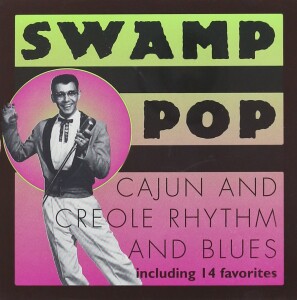 Swamp Pop: Cajun and Creole Rhythm and Blues is a companion CD to a book of the same name by Shane K. Bernard. With or without the book, it’s an excellent primer in the Louisiana-based style of rock ‘n’ roll known as swamp pop. The CD has 14 tracks, comprising some of the high water marks of swamp pop between 1958 and 1971.
Swamp Pop: Cajun and Creole Rhythm and Blues is a companion CD to a book of the same name by Shane K. Bernard. With or without the book, it’s an excellent primer in the Louisiana-based style of rock ‘n’ roll known as swamp pop. The CD has 14 tracks, comprising some of the high water marks of swamp pop between 1958 and 1971.
As was the case with its cousin rockabilly, none of the musicians who made this music called it swamp pop. That moniker was pinned on the music in the 1970s by English journalists who were fans of the distinctive rock ‘n’ roll sound that came out of Louisiana starting in the mid-1950s.
These young Cajun and Black Creole musicians were just making rock ‘n’ roll, as far as they knew. They used the tools they had at hand, which included accordions, electric guitars, drums, pianos and wailing saxophones. As with their parents’ Cajun and Creole music, it was intensely emotional in lyric and delivery, and the lyrics were sometimes in French, sometimes English, sometimes both.
It made the national charts in many instances. Many of the biggest swamp pop hits are included on this disc, including perhaps the best known of all as the opening track, “Mathilda,” by Cookie and the Cupcakes. This quintessential swamp pop song has all the features: emotional lyrics and delivery, a triplet-based rhythm established by the piano and bass, and highly charged guitar and saxophone solos or “rides.”
Cookie and the Cupcakes also sing a cover version of the number-one hit “Sea of Love,” which shows Cookie Thierry’s strong baritone voice to great effect; and Dale and Grace’s number-one hit “I’m Leaving it Up to You.”
The author’s father, Rod Bernard, shows up on three tracks, including the up-tempo “Colinda,” a song that has roots in an Afro-Caribbean dance of the 19th Century. Bernard, who has a very youthful tenor on these tracks, came close to the big time but gave up on a career in music in disgust at the way he and his music were treated by the music machine in Nashville.
_Swamp Pop_ includes several other fast numbers, including the infectiously danceable “Hippy-Ti-Yo,” and “Let’s Do the Cajun Twist,” by Bobby Page and the Riff Raffs and Randy and the Rockets, respectively. Rock ‘n’ roll doesn’t get any more fun than these two songs, which hold their own against anything by Fats Domino, the Kingsmen or Chuck Berry.
A decidedly odd track is “Opelousas Sostan,” recorded in 1971 by what may have been the only hippie swamp pop band, Rufus Jagneaux. Set to an old-time Cajun-style waltz tune, it’s an honest homage to the spirit and people of Cajun country, but it caused a lot of grief for bandleader Benny Graeff, who was accused of parodying the people and the music.
Since this is a companion CD to a book, it doesn’t have any liner notes as such, which is too bad, because with them it could stand on its own quite well. My only other minor criticism is that it’s in chronological order rather than some other sequence that might have made more sense musically; that and it’s too short! But Swamp Pop is a lot of fun to listen to, and shines a well-deserved spotlight on this lively and inspired music.
(American Made Music, 1996)
